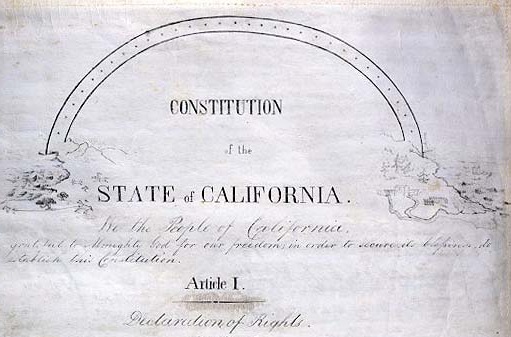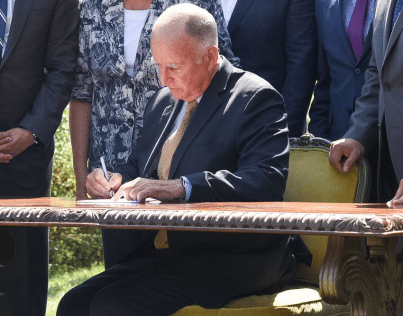
California Bear Flag. (Photo: ca.gov)
The California Governor’s Reorganization Plans
The California Constitution authorizes a statute to allow the Governor to reorganize functions among state agencies
By Chris Micheli, February 24, 2020 2:18 am
The California Constitution grants the Governor, subject to approval by the Legislature, the authority to “assign and reorganize functions among executive officers and agencies and their employees.” A reorganization of the executive branch of government is called a “Governor’s Reorganization Plan,” or more commonly known as a “GRP.”
Article 5, Section 6 of the California Constitution authorizes a statute to allow the Governor to reorganize functions among state agencies other than the remaining constitutional offices. As such, a GRP is actually a bill that is submitted to the Legislature for approval, after consideration by the Little Hoover Commission (LHC) at least 30 days prior to the GRP’s submission to the Legislature. The LHC’s role is set forth in California Government Code Section 8523, which was put into statute in 1974 by Chapter 1242.
Following review and one or more public hearings on the proposed GRP, the Little Hoover Commission offers a recommendation to the Legislature to either allow the GRP to go into effect or to reject the GRP. Each house of the Legislature has 60 calendar days to act on the GRP. The GRP takes effect on the 61st day after submission to the Legislature, unless a resolution rejecting the GRP is adopted by both the Senate and Assembly by a majority vote of each house.
Government Code Section 8523(a) requires the Governor to submit to the Little Hoover Commission “for study and recommendation any reorganization plan which he intends to submit to the Legislature” at least 30 days prior to submission of the GRP to the Legislature. Then the LHC must make its report to the Governor and the Legislature within 30 days of the date on which the Governor submits his or her GRP to the Legislature.
Pursuant to state law, the LHC may undertake a study of the GRP submitted to the Legislature and make reports to the Governor and the Legislature as it deems necessary. Prior to transmittal of a GRP to the LHC, the Governor must submit each GRP to the Legislative Counsel in order that it may be submitted to the Legislature in the form and language suitable for enactment as a statute. The Legislative Counsel also prepares a digest of the GRP.
Under Government Code Section 8523(b), it is the intent of the Legislature in requiring the use of statutory language to insure that GRPs submitted to the Legislature express clearly and specifically the nature and purposes of the GRP. Note that, under Section 8523(c), the Governor may submit a GRP directly to the Legislature if that GRP is substantially identical to a plan previously submitted to the LHC during the same legislative session.
The LHC’s role in the GRP process is advisory and the LHC begins that process by conducting one or more public hearings in order to provide a forum for affected agencies, constituencies and interest groups to comment on the proposed GRP. In addition to invited witnesses, the Commission hears testimony from other interests or members of the public who would like to testify.
The LHC assesses the GRP based on its broad mandate to assist policy-makers in “promoting economy, efficiency and improved service in the transaction of the public business.” The LHC’s report offers a recommendation on whether the plan should go into effect. A GRP may be delivered to the Legislature at any time during a regular session, provided the Legislature has at least 60 calendar days of continuous session remaining to consider the plan.
The Governor’s reorganization process is an important one for the Governor to assign new duties or change existing duties of state agencies and departments. The last GRP was done in 2012 under Governor Brown to restructure various agencies and departments under this authority and control.
- Miscellaneous Civil Action Proceedings - February 23, 2026
- Probate Code Could Be a Basis for Statutory Interpretation Principles - February 22, 2026
- Conservation Banks - February 22, 2026





Papa88
Another layer of experts to screen what goes into legislature. So the Governor is letting us all know that the legislature people are not up to the job. We all know that already due to the fact that the State is near bankrupt and will have to cut pensions and salaries to be the same as for “kitchen table folks”. Our schools are 39th in national rating having the largest budget in the nation. If anyone asks me where I am from, I don’t say CA.